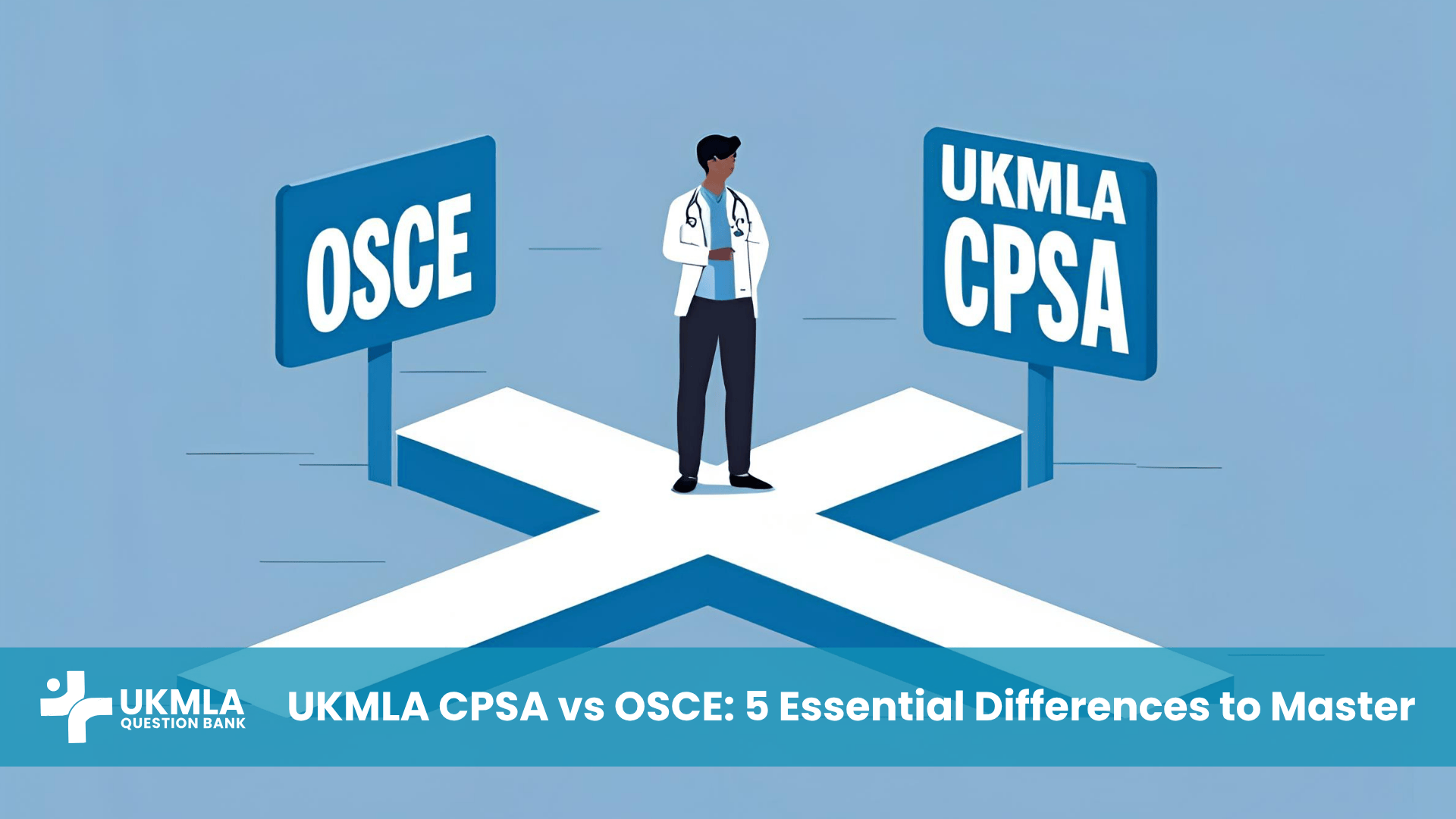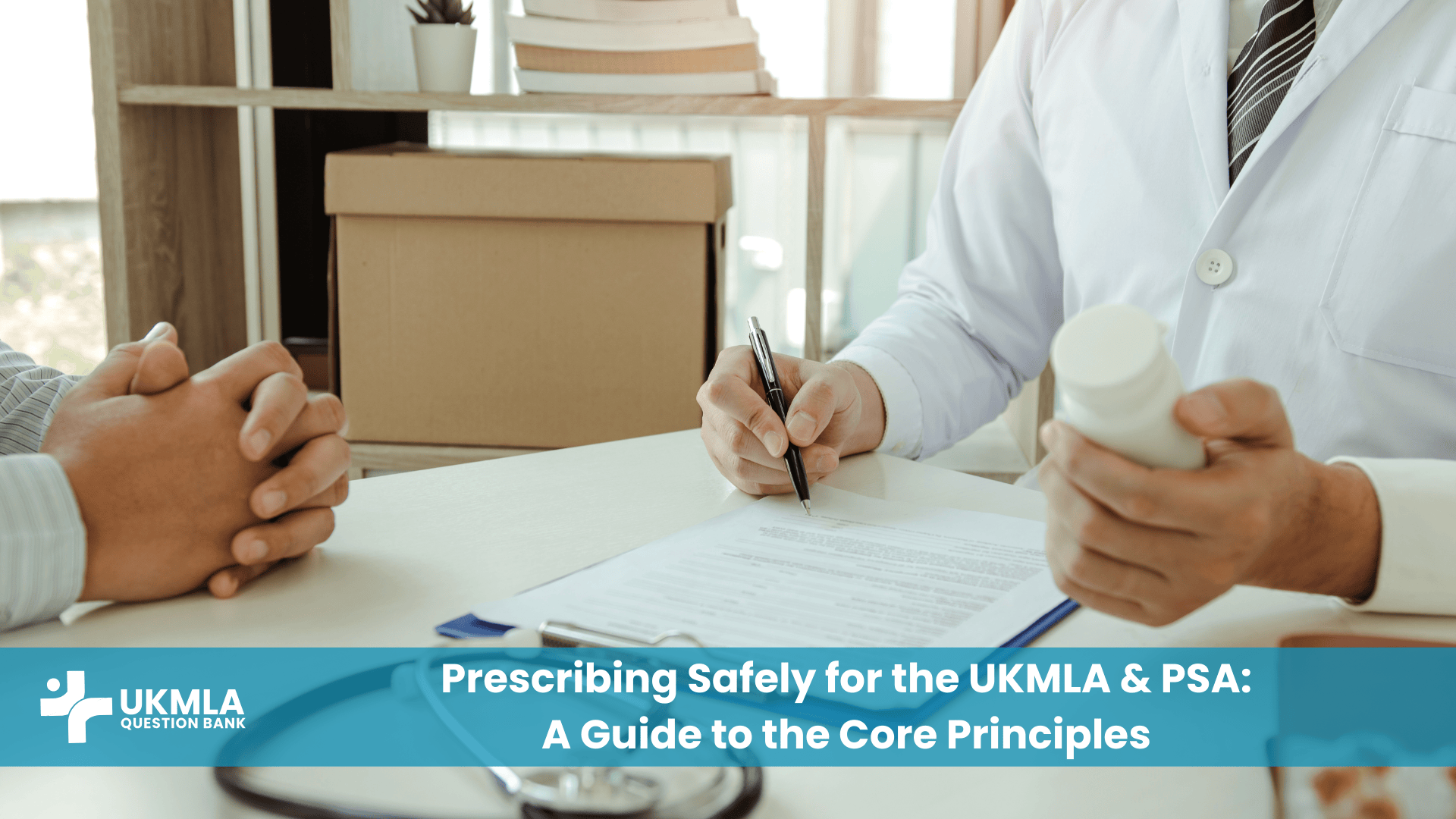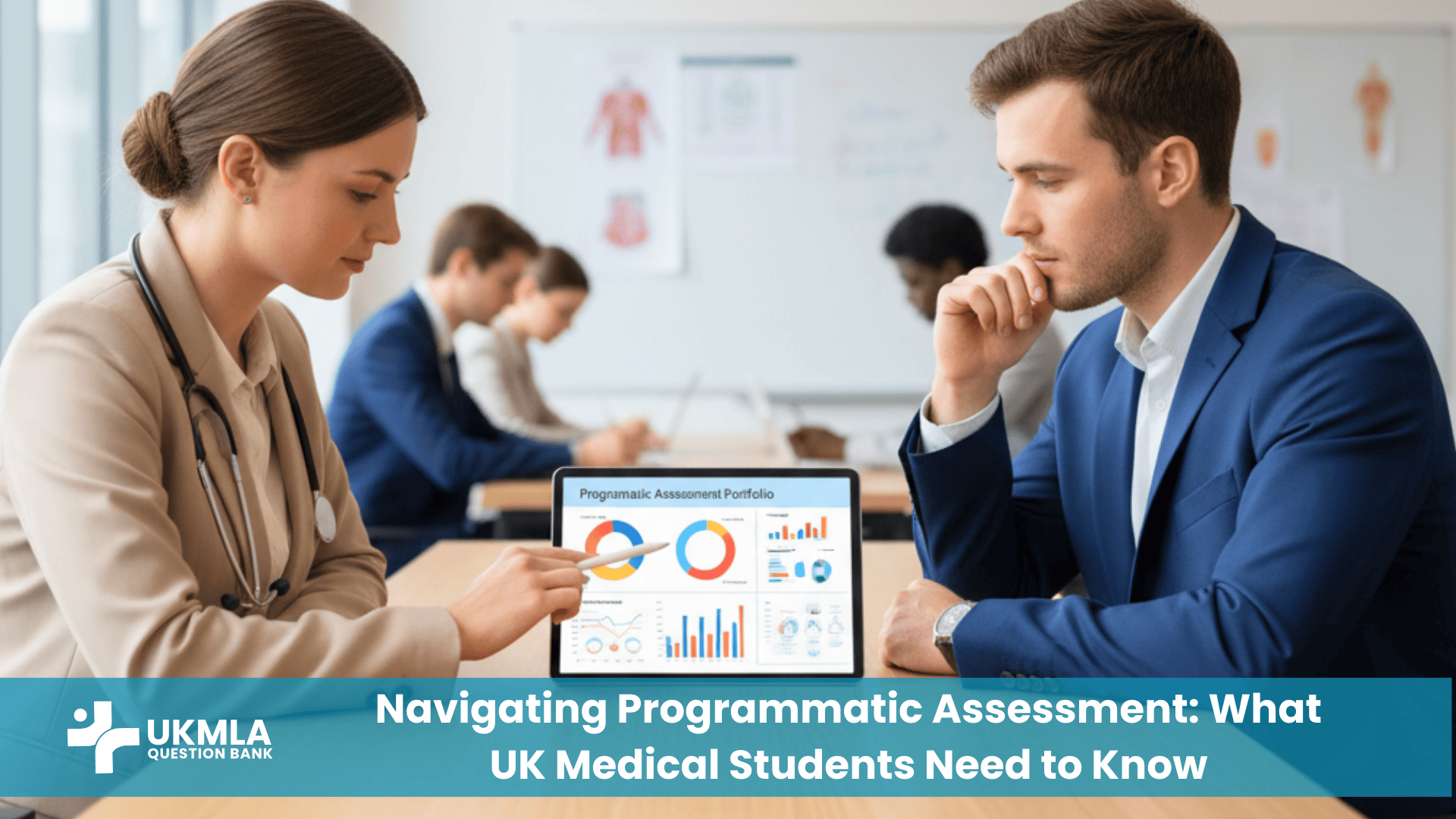Introduction
Understanding the core differences in the UKMLA CPSA vs OSCE debate is the first step towards refining your preparation for the most important practical exam of your career. While the station-based format feels familiar, the CPSA is a critical evolution from the university OSCEs you’re used to. This guide is designed to bridge that gap by dissecting the 5 essential differences, empowering you to adapt your proven skills and approach this final hurdle with confidence.
Before we dive in, let’s clarify the terms themselves. Think of the OSCE as the broad, generic format of any practical exam that uses timed, structured stations. The UKMLA CPSA, on the other hand, is the specific, official name of the final assessment that is delivered using this OSCE format. Therefore, while the CPSA is a type of OSCE, it’s the high-stakes, national version that demands a unique approach.
Key Takeaways
The CPSA is a National Standard: Unlike university OSCEs that vary, the CPSA is a single, national benchmark set by the GMC to ensure a uniform standard of safety for all new doctors.
Focus Shifts to “Readiness for Practice”: The CPSA prioritizes common, high-stakes clinical scenarios relevant to a Foundation Year 1 doctor over niche academic knowledge that might be tested in university exams.
Expect Integrated Scenarios, Not Isolated Tasks: Be prepared for longer, multi-stage stations that combine skills like history-taking, examination, and management, reflecting a real patient consultation rather than a single skill test.
It’s a High-Stakes Licensing Exam: The CPSA is a pass/fail gateway to your medical license, where demonstrating consistent safety across all stations is more important than achieving a high score or ranking.
Adaptation is Essential for Success: You must evolve your proven OSCE skills by adding a heightened focus on professionalism, patient safety, and integrated clinical management to meet the unique demands of the CPSA.
The Core Differences: A Deep Dive into UKMLA CPSA vs OSCE
While the format of rotating through timed stations may feel identical, the philosophy, focus, and stakes of the UKMLA CPSA vs OSCE are worlds apart. Let’s break down the five essential shifts in perspective you need to master.
1: A Single National Standard vs. University Variation
The most fundamental difference lies in standardisation. Your university OSCEs are designed to assess your progress within a local curriculum, whereas the CPSA is designed to certify your competence against a single national benchmark.
University OSCEs Explained: These exams are created and marked by your medical school’s faculty. This means they are inherently tailored to the specific curriculum you’ve been taught. The stations often reflect the “pet topics” or research interests of local departments. While robustly quality-assured, this leads to natural variations in style, content focus, and difficulty across different UK medical schools.
The UKMLA CPSA Standard: The CPSA, in contrast, is governed by the GMC (General Medical Council), which outlines the full requirements and quality assurance process in its official guide to the CPSA. It establishes a unified threshold for safety and competence that every single medical graduate must meet to earn a license to practise. You are no longer being compared to your immediate peers; you are being measured against a national standard for a Foundation Year 1 (FY1) doctor. This ensures that a doctor who qualified in London has demonstrated the same core competencies as one who qualified in Edinburgh or Belfast. For more detail, you can explore the purpose of the Medical Licensing Assessment on the GMC’s official website.
2: Focus on “Readiness for Practice” vs. Academic Knowledge
This difference dramatically impacts the feel and content of the stations you will encounter. It’s a shift from academic assessment to vocational certification.
The Academic Focus of OSCEs: University OSCEs are often summative assessments for specific modules (e.g., cardiology, neurology). As such, they have a duty to test the full breadth of that academic curriculum. This can lead to stations on rarer conditions or niche diagnostic tests, designed to see if you were paying attention in lectures.
The CPSA’s Pragmatic Focus: The CPSA’s mandate is singular: to determine if you are ready for safe, independent practice on Day 1 of your FY1 year. The content is therefore intensely practical and reflects the common, important, and high-stakes situations you will genuinely face in a hospital or GP setting. The emphasis shifts from “can you list the causes of clubbing?” to “can you safely assess an acutely breathless patient and initiate appropriate management?”
From the General Medical Council’s “Outcomes for Graduates”: “Newly qualified doctors must be able to apply knowledge and skills in a practical setting. They must demonstrate their ability to manage common clinical presentations and make safe decisions that prioritise patient wellbeing.”
This quote encapsulates the spirit of the CPSA. It is less about what you know and more about what you can do with what you know to keep patients safe.
3: Specific Assessment Domains vs. General Marking
The way your performance is evaluated in the UKMLA CPSA vs OSCE is more formally structured and transparent.
Varied OSCE Marking: University OSCE marking schemes can be a “black box” at times. Some use detailed checklists where every point is worth a mark, while others use global rating scales based on an examiner’s overall impression.
The Four CPSA Domains: The CPSA is explicitly marked against four domains set by the GMC. You must demonstrate competence across all relevant domains in a station, not just perform the “main task.” These are:
Data gathering, technical and assessment skills: Your ability to take a history, perform a physical examination, and carry out practical procedures correctly.
Clinical management skills: Your ability to formulate a differential diagnosis, create a safe and effective management plan, and prescribe safely.
Interpersonal skills: This domain is heavily weighted and assesses your communication with patients, relatives, and colleagues, including your ability to show empathy and build rapport.
Professionalism and patient safety: This critical, overarching domain looks at your attitude, ethical reasoning, and your ability to proactively ensure patient safety at all times (e.g., hand hygiene, checking allergies, recognising the limits of your competence).
4: Integrated Scenarios vs. Isolated Tasks
This is a key practical difference in station design that requires a significant shift in your preparation strategy.
The Isolated Nature of OSCEs: It is very common in university OSCEs to have stations that test a single, isolated skill. For example, one 7-minute station might be “Perform a respiratory examination,” and the next 7-minute station is “Interpret this chest X-ray.”
The Integrated CPSA Approach: The CPSA is designed to better reflect a real consultation. A single, longer station (e.g., 15-20 minutes) is more likely to be integrated, requiring you to manage a patient encounter from start to finish. This could involve taking a focused history, performing a relevant examination, interpreting results presented to you, explaining your findings to the patient, and then documenting a plan.
5: A Pass/Fail Licensing Exam vs. a University Grade
Finally, the stakes of the assessment are fundamentally different, which should alter your entire approach to preparation.
OSCEs and University Ranking: Your performance in a university OSCE typically contributes to your overall mark or grade for the year. There is often a focus on ranking and deciles, which can encourage students to compete for every last mark, sometimes by demonstrating flair or niche knowledge.
The CPSA as a Professional Hurdle: The CPSA is a high-stakes, pass/fail gateway to a medical license. Your performance does not result in a grade; it results in the ability to practise medicine. The goal is not to be the “best” in the country, but to prove you are consistently safe and competent. This means that a steady, reliable, and safe performance across all stations is far more valuable than demonstrating brilliance in a few complex stations but failing a simple one on safety grounds.
Clinical Pearl: The CPSA Mindset Shift “Your university OSCEs taught you to think like a top medical student. The CPSA requires you to act like a reliable Foundation Year 1 doctor. The former chases every point; the latter prevents every error.”
OSCE vs. CPSA at a Glance: Comparison Table
For a quick summary, this table breaks down the key differences.
Table 1: OSCE vs. CPSA at a Glance
| Feature | University OSCE (Objective Structured Clinical Examination) | UKMLA CPSA (Clinical and Professional Skills Assessment) |
|---|---|---|
| Standardisation | Varies by university; based on local curriculum. | Single national standard set by the GMC. |
| Primary Focus | Often academic; testing the breadth of a specific module. | Vocational; assessing “readiness for safe practice” on Day 1. |
| Assessment | Variable marking schemes (checklists, global ratings). | Explicitly marked against 4 domains (Data, Management, Interpersonal, Safety). |
| Station Style | Often tests isolated skills (e.g., just an exam or a history). | Favours integrated scenarios (e.g., history, exam, and plan in one station). |
| The Stakes | Contributes to a university grade or ranking. | A high-stakes, pass/fail gateway to a medical license. |
How to Adapt Your OSCE Preparation for CPSA Success
Understanding these differences is the first step. Adapting your revision is the next.
Broaden Your Scope: Don’t just rely on your university’s past papers or “hot topics.” Your preparation must be mapped to the GMC’s UKMLA Content Map, which outlines the full range of presentations and conditions you could be expected to manage as an FY1 doctor.
Emphasise Professionalism: In every practice station, actively think about patient safety. Are you washing your hands? Are you checking for allergies? Are you confirming patient details? Are you considering the ethical implications of your actions? These are no longer “tie-breaker” points; they are central to the assessment.
Practice Integrated Scenarios: Move beyond practising isolated skills. Use resources like the UKMLA Question Bank to work through complex, multi-stage scenarios that mimic the integrated nature of the CPSA. Practice combining history, examination, communication, and documentation into a single, fluid encounter against the clock.
Frequently Asked Questions (FAQ): Your UKMLA CPSA vs OSCE Questions Answered
It’s not necessarily “harder” in terms of the clinical knowledge required, but it is different. The standard is rigorously benchmarked to ensure national safety. The focus on integrated skills and professionalism can make it more challenging if your preparation has only focused on isolated tasks.
No. While the CPSA must meet the GMC’s national requirements and map to the same content blueprint, each medical school is responsible for designing and delivering its own version. However, the standard you are expected to meet is the same everywhere.
Unlikely. The practical skills required are outlined in the GMC’s “Outcomes for Graduates” and should have been covered by your medical school. The difference is in the expectation that you can perform them safely, effectively, and often as part of a more complex scenario.
Because CPSA stations are often more integrated, they may be longer than some traditional OSCE stations. You might have a 15-20 minute station that includes reading time, the encounter itself, and time for post-encounter documentation. Effective time management is therefore essential.
It is critically important. The “Interpersonal Skills” domain is one of the four key areas of assessment. Your ability to build rapport, explain concepts clearly, show empathy, and involve the patient in decision-making is explicitly marked and can be the difference between a pass and a fail.
In every practice scenario, make safety your first thought. This includes simple things like hand hygiene and confirming patient ID, but also bigger concepts like recognising the limits of your competence, knowing when to escalate to a senior, and considering ethical principles.
Yes. The CPSA is not just a test of knowledge; it’s an assessment of skills and professional behaviours. A candidate who is clinically brilliant but demonstrates poor communication, unprofessional behaviour, or an unsafe practice can fail.
Yes. Your medical school is required to provide you with detailed information about the format, structure, and assessment criteria for the CPSA they will be delivering. You should always use this as your primary source of information.
They are two parts of the same licensing assessment. The AKT tests your ability to apply knowledge in a written, multiple-choice format, while the CPSA tests your ability to apply knowledge and skills in a practical, performance-based setting. Both must be passed to gain your license.
For IMGs, the GMC delivers the CPSA at their own clinical assessment centre in Manchester. While the location is different, the exam is designed to meet the exact same requirements and standards as the CPSA delivered by UK medical schools, ensuring a single, unified threshold for practice.
Conclusion & Call to Action (CTA)
Ultimately, the shift from your university OSCE to the UKMLA CPSA is one of perspective. It’s a move from being a top student to being a safe and effective junior doctor. By understanding the five essential differences—the national standard, the focus on practical readiness, the specific assessment domains, the integrated scenarios, and the high-stakes nature of the exam—you can tailor your preparation effectively.
Your OSCE skills provide a fantastic foundation, but success in the CPSA requires you to build upon them with a relentless focus on safety, professionalism, and holistic patient care. This isn’t just another exam; it’s your final gateway to the profession.
Ready to practice scenarios that are benchmarked to the national standard? Explore the UKMLA Question Bank to sharpen your skills with cases designed to reflect the integrated nature of the UKMLA CPSA.




